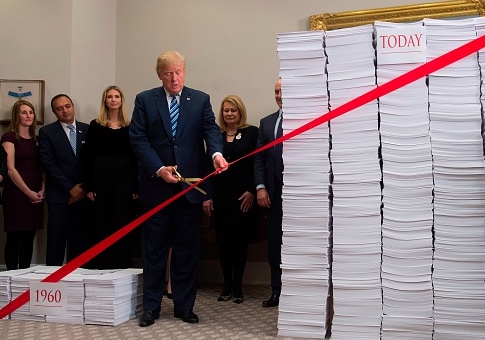Kerby Anderson
Many presidential candidates campaign on the promise to roll back regulations that stifle innovation and stymie business growth. Once those candidates get into office, very little regulatory reform takes place.
That is why what has happened in the Trump administration last year is so significant. The Wall Street Journal editors estimated that his presidency had been “reining in and rolling back the regulatory state at a pace faster than even Ronald Reagan.”
They also remind us that regulator rollback is harder than it sounds because of the inertial tendency of bureaucracies to expand their sphere of influence. Look at the last two presidents. Under Barack Obama, the Federal Register had six of the seven highest annual page counts. George Bush also expanded the federal government through various rules and regulations.
President Trump went in a different direction. Ten days after his inauguration, he issued an executive order that required federal agencies to eliminate two regulations for every new one implemented. By mid-year, we heard that the ratio was no longer two-to-one but closer to seven-to-one.
By the end of 2017, the White House Office of Information and Regulatory Affairs estimated that the ratio was 22 to 1. Also, more than 1,500 planned regulatory actions were withdrawn or delayed. This includes orders ranging from transgender bathrooms to how colleges adjudicate charges of sexual assault.
It is also worth mentioning what Congress has done. As I have talked about in previous commentaries, congressional leadership has used the Congressional Review Act to nullify rules issued by previous administrations that were never published with an opportunity for public comment. So far, they have removed 14 Obama-era rules along with one Consumer Financial Protection Bureau rule.
We still have so many rules and regulations, it is nearly impossible to know and obey every one in the Federal Register. Many rules place onerous requirements for reporting on businesses. We should applaud any attempt to reduce the regulatory burden on all of us.
 Listen Online
Listen Online Watch Online
Watch Online Find a Station in Your Area
Find a Station in Your Area











 Listen Now
Listen Now Watch Online
Watch Online
